Anya Almarez, sports.vice.com; via BM
Facing growing tensions with U.S. allies, threats of drastic budget cuts, and an "America First" agenda, the U.S. Sports Diplomacy Division faces some of its biggest challenges ever.
Within view of the Washington Monument and Lincoln Memorial, in an annex right across from the State Department headquarters, a small group of people is on a mission to help the U.S. build better international relations, not through treaties or peacekeeping forces but with tools like soccer balls and basketball hoops.
The Sports Diplomacy Division of the U.S. Department of State's Bureau of Educational and Cultural Affairs employs only five staffers and spends only .0001 percent of the Department budget. And yet, it has still managed to recruit some of the country's most celebrated athletes to the cause, and its programs have reached thousands of people in more than 100 countries over the past 15 years.
"We are a small team, but we like to believe we punch above our weight," said Trina Bolton, a program officer for the division. "Our program opens doors in hard-to-reach spaces, all the way from really grassroot levels and all the way up to the governmental level at home and abroad. Through our exchanges, Americans and international participants from all walks of life connect through the shared interest in sports."
Under President Donald J. Trump, however, the Sports Diplomacy Division (also known as SportsUnited) now faces a unique set of challenges, and a new level of uncertainty. Even before the election, Trump was earning "rock-bottom ratings" in countries outside the U.S., and things have only got worse since he's taken office. From intelligence sharing to the climate agreement to Qatar, Trump has stumbled from one diplomatic gaffe (or worse) to the next since his inauguration.
Perhaps this might highlight the continued need for sports diplomacy, but the White House relationship with the State Department hasn't been going so smoothly, either, and now Trump and Secretary of State Rex Tillerson are proposing to slash the department's budget by 32 percent.
Amid the turmoil, the fortunes of a small division dedicated to sports has not attracted much attention, but between growing tensions with U.S. allies on one hand and within the government on the other, it's fair to wonder what the future of American sports diplomacy will look like—or if it will exist at all.
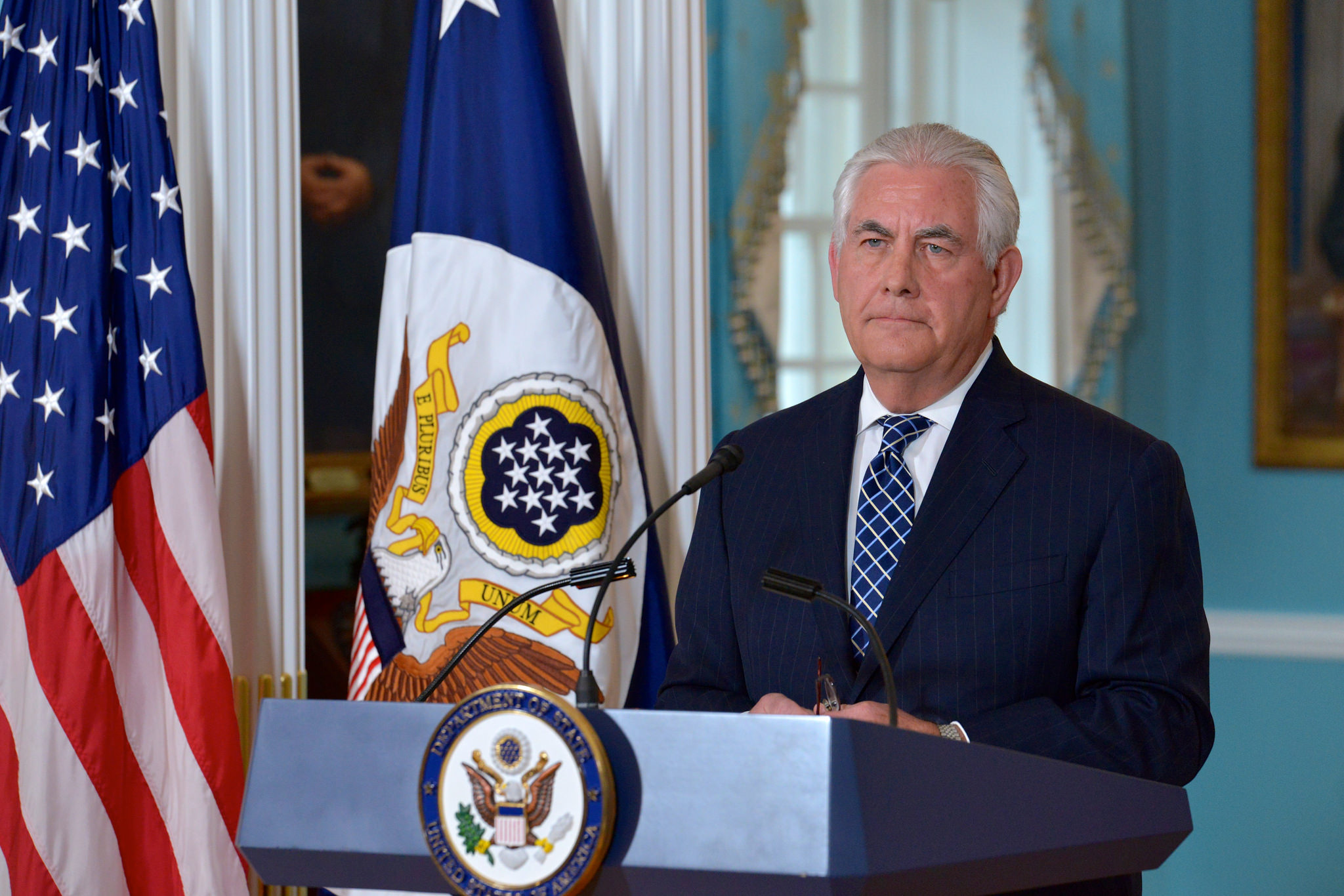
Secretary of State Rex Tillerson. State Department photo/ Public Domain
The use of sport as an instrument of foreign policy is nothing new for the U.S. government. Probably the most famous example took place during the Nixon Administration, when the People's Republic of China invited the U.S. table tennis team to visit in 1971. They were the first Americans to enter the country since the Chinese Revolution, and the gesture helped open Sino-American relations after nearly a quarter-century standoff.
"Probably never before in history has a sport been used so effectively as a tool of international diplomacy," TIME Magazine wrote at the time.
It wasn't until after September 11, 2001, however, that the State Department created an official office for it. Recognizing that the U.S. needed to improve its image in the Muslim world, then Secretary of State Condoleezza Rice sought to revamp public diplomacy at her department (even as George W. Bush was starting wars in Afghanistan and Iraq).
A major component of outreach to Muslim youth—one that Rice later described in her memoir as "near to my own heart"—was through sport. These efforts revolved mostly around exchange programs that brought athletes and coaches to the U.S., such as Iraqi archers in 2003; grants to fund outside initiatives; and a new sports envoy program that sent professional athletes like Michelle Kwan and Cal Ripken Jr. overseas to promote American interests.
The initiatives appeared to be an effective form of outreach. A State Department evaluation of SportsUnited programs from 2002-09 found that they had a "profound impact" on participants who were surveyed.
"The vast majority of Sports Visitor and Sports Grants survey respondents reported that their views of the U.S. Government and the American people (87% and 92%, respectively) were more positive after participating in the program," the 2013 report said. "In particular, more than half of the respondents (58%) characterized their views of the American people as 'much more favorable' after the program."
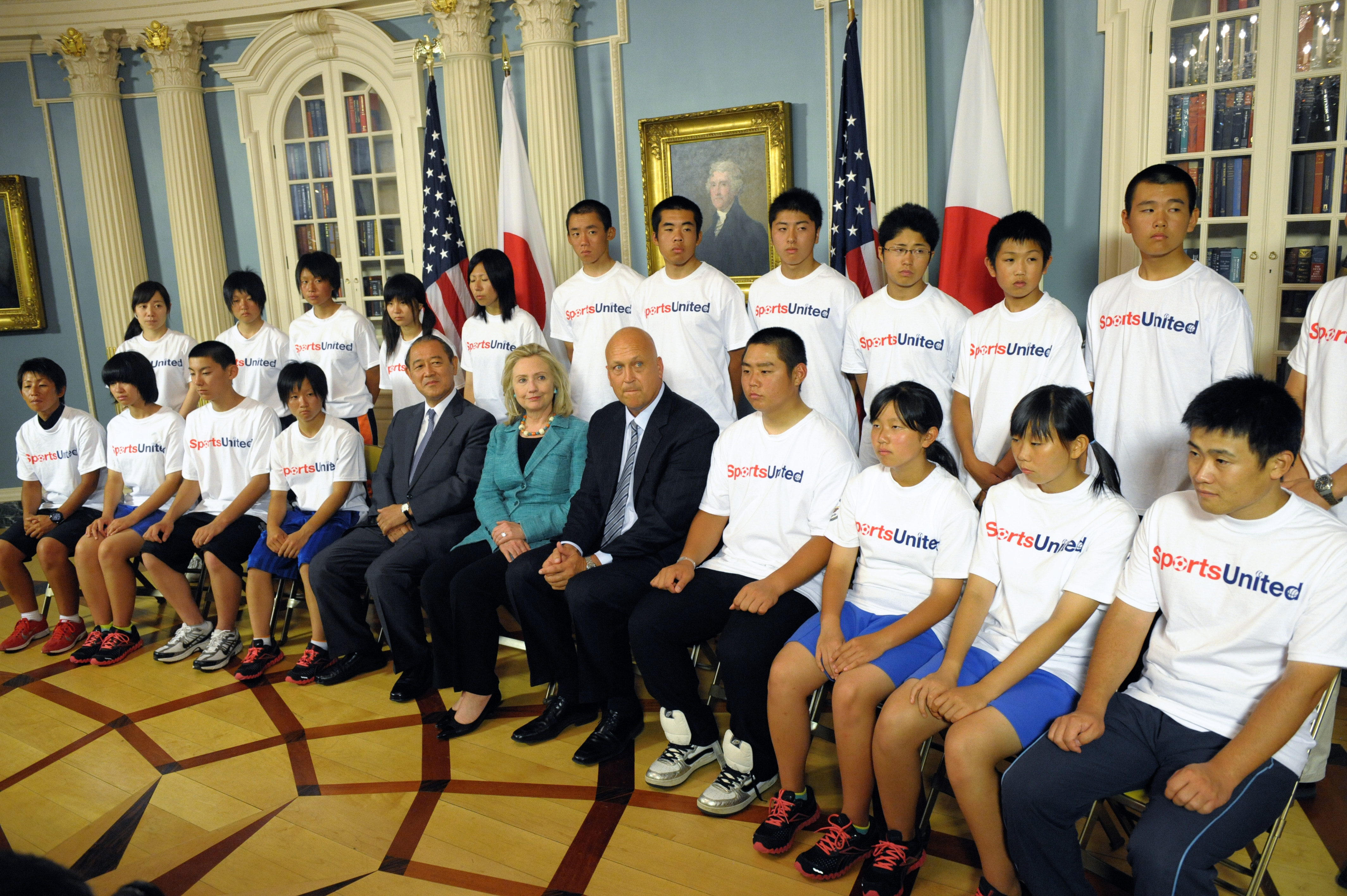
Hillary Clinton, Cal Ripken, Jr., and youth baseball and softball players from Japan in a 2011 exchange. State Department photo/ Public Domain
The division's work expanded further under Secretary of State Hillary Clinton, who once called sports exchanges "the most important exchanges that we do." During her tenure, Sports Diplomacy more than doubled the number of countries and participants its programs reached, and introduced new initiatives like the Global Sports Mentoring Program, a partnership with espnW that focuses on empowering women in developing countries.
Since 2012, GSMP has paired women from around the world with Americans like Deborah Stroman, a professor at the University of North Carolina and the director of UNC's Center of Sport Business. Last year, Stroman advised a young sports journalist and athlete named Pamela Akplogan from Benin, which ranks 134th out of 152 countries in the UN's Gender Inequality Index. The goal of the program is to give women like Akplogan the tools to make an impact in their communities by increasing opportunities for women and girls through sport.
"[Pamela] is now going through the steps of the action plan we created for her, and that involves empowering the young girls using soccer and basketball," Stroman said. "Her goal is to have a camp where she does not only character-building and teaching the technical skills of the sport but also giving them a foundation to dream and inspiring them to dream."
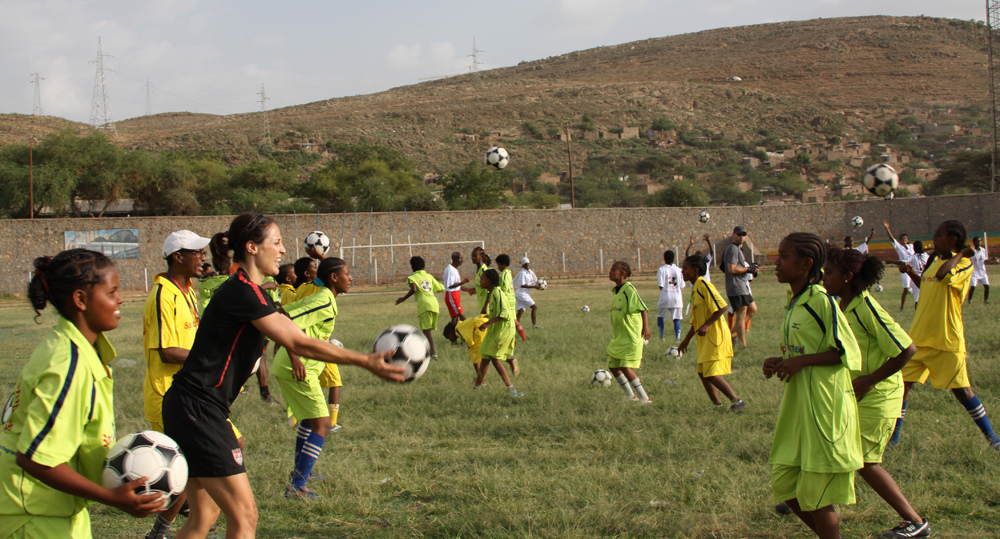
Kate Markgraf plays with Ethiopian girls in 2012. USDoS/ECA photo
Uniting the various programs is a common goal, one the Sports Diplomacy Division has historically shared with the State Department at large: to build better relationships between the U.S. and the rest of the world.
"All of our programs have a foreign policy priority, whether it's conflict resolution using sports, women's empowerment, disabilities rights, entrepreneurship in sports, or economic empowerment," Bolton said.
The Sports Diplomacy Division has also tended to reflect the priorities and interests of whoever is currently in power. Secretary Clinton, for example, placed a special emphasis on women's rights around the world; under Secretary John Kerry, a State Department-wide focus on environmental issues in 2013 led to a sports and sustainability initiative in the ECA.
More recently, the Sports Diplomacy Division sent former NBA star Shaquille O'Neal and American Ballet Theatre principal dancer Misty Copeland to Cuba in the midst of President Barack Obama's historic rapprochement with the country.
"Both Shaquille O'Neal and Misty Copeland are these larger than life personalities," said Matt McMahon, the head of the Sports Diplomacy Division, "and to have them engage in a personal way with Cuban youth through the lens of basketball or through the lens of dance and ballet, I think it did a lot to kind of humanize the United States for Cuban audiences."
The Trump Administration has represented a dramatic departure from its predecessors so far. Secretary of State Rex Tillerson is a former oil executive whose diplomatic experience is limited to representing shareholders' interests, not the public at large. Women's empowerment? Combatting climate change? The Trump Administration has already aimed to reduce funding for programs that benefit women abroad, and pulled out of the Paris Climate Agreement.
Instead, Trump and Tillerson's overarching focus appears to be twofold: putting "America First," and gutting the State Department. In its budget request for the 2018 fiscal year, the White House has proposed slashing funding for State and other international programs by nearly a third, among the steeper cuts for any agency. The Department of Defense, meanwhile, got a proposed $52 billion increase.
"This budget request reflects the President's 'America First' agenda that prioritizes the well-being of Americans, bolsters U.S. national security, secures our borders, and advances U.S. economic interests," Tillerson said in a statement last month when the budget was released.
According to the Washington Post, the ECA was "originally slated for extinction" entirely; instead the final White House budget cuts the bureau's funding to $285 million, less than half of the $590 million appropriated for 2016. Should that kind of drastic cut actually happen, the ECA's focus would shift to programs like the Fulbright and International Visitor Leadership program, still making the Sports Diplomacy Division vulnerable. The office has little room to absorb cutbacks—it employs only five people, and its budget this year is just $5.5 million, or .0001 percent of the State Department and USAID's overall funding.
"We recognize that we are in a tight fiscal environment and we are always having to look again and again at how we're managing our programs," McMahon told VICE Sports. "We are conscious that we are overseeing taxpayer money and we're trying to be as efficient and effective as we can be."
The division also partners with a number of leagues and organizations, including the NBA, the U.S. Olympic Committee, U.S. Soccer, and other national governing bodies.
"The private-public partnerships help, along with the athletes who donate their time and cover their expense. That's why I'm surprised at the generosity of these sports envoys, because we can't compensate them beyond the airfare, the per diem, and hotel," McMahon said.
For former MLS player Tony Sanneh, who has served as an envoy on multiple trips since 2010, the importance of the mission is obvious. "I think sports diplomacy provides an avenue and a language that everybody understands," he told VICE Sports. "At a minimum, everyone is seated at the table together, and actually celebrating and appreciating our differences, but also recognizing some things that we can change together."
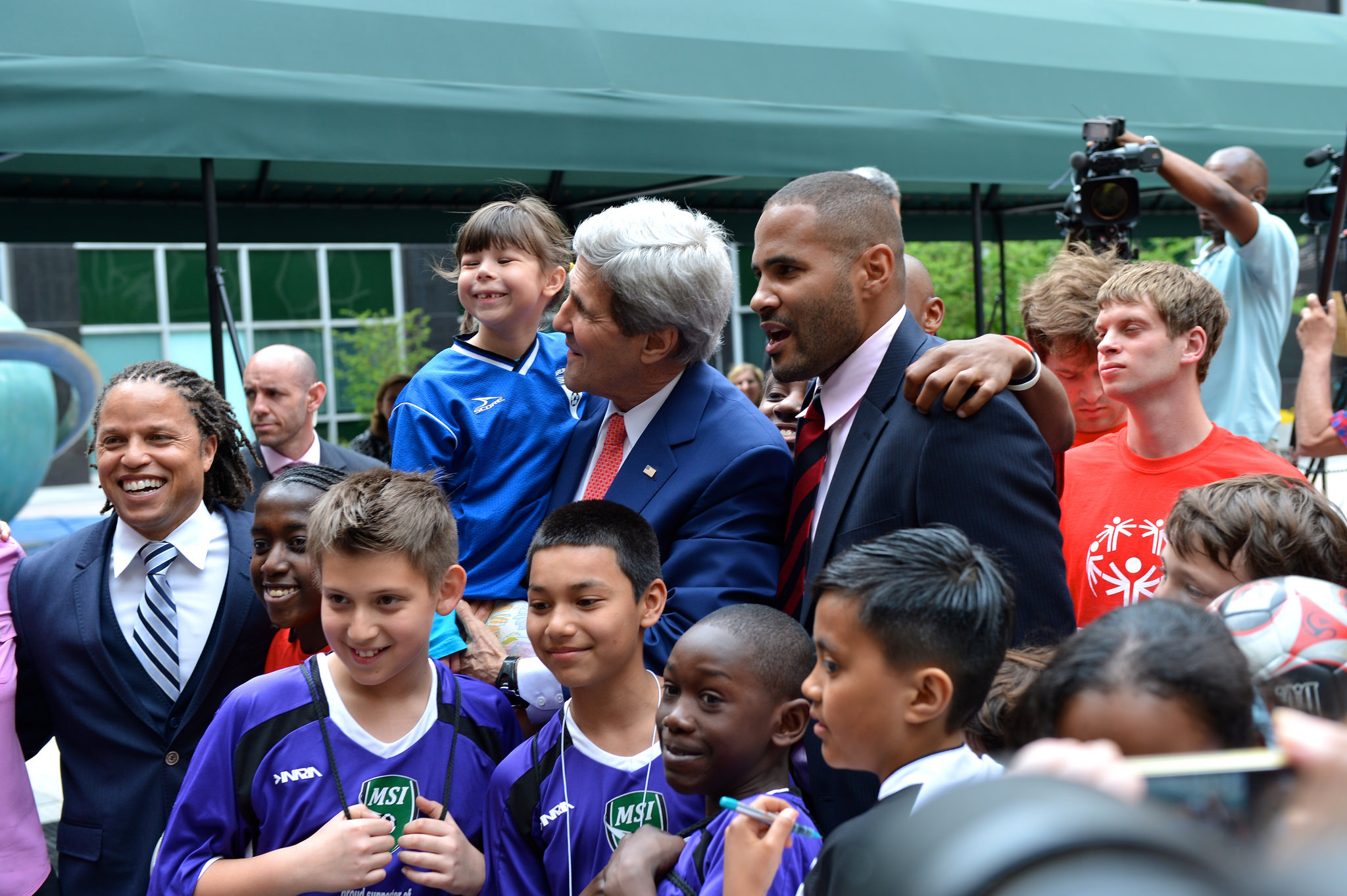
Tony Sanneh and Secretary of State John Kerry in 2014. State Department photo/ Public Domain
Fortunately for the Sports Diplomacy Division and others, the White House budget proposal is unlikely to be passed in its current form by Congress. The suggested cuts have received widespread pushback, and senators from both parties grilled Tillerson about the matter in hearings earlier this week. "This budget will cost influence," Republican Senator Lindsey Graham said. "It's going to put lives at risk."
For now, Sports Diplomacy's programs continue to run; just last week, a couple of Team USA judoka went to Marseille as envoys. Still, the looming threat of any budget cuts and other State Department issues have created uncertainty for Bolton and McMahon, who don't know how their programs and initiatives may be affected, or if their division will receive the support it had under previous secretaries and presidents.
(It's worth noting at least one potential supporter in the Trump Administration: Dina Powell, Trump's current deputy national security advisor, helped launch the sports envoy program as the Assistant Secretary of State for Educational and Cultural Affairs from 2005 to 2007—a position that Trump has yet to nominate anyone to fill 146 days into his presidency.)
"Our main challenge is being able to respond to the positive demand we have in our department and at our embassies around the world who really do see the value of engaging," Bolton said. "There are even more opportunities out there, so it would heartbreaking to miss them."
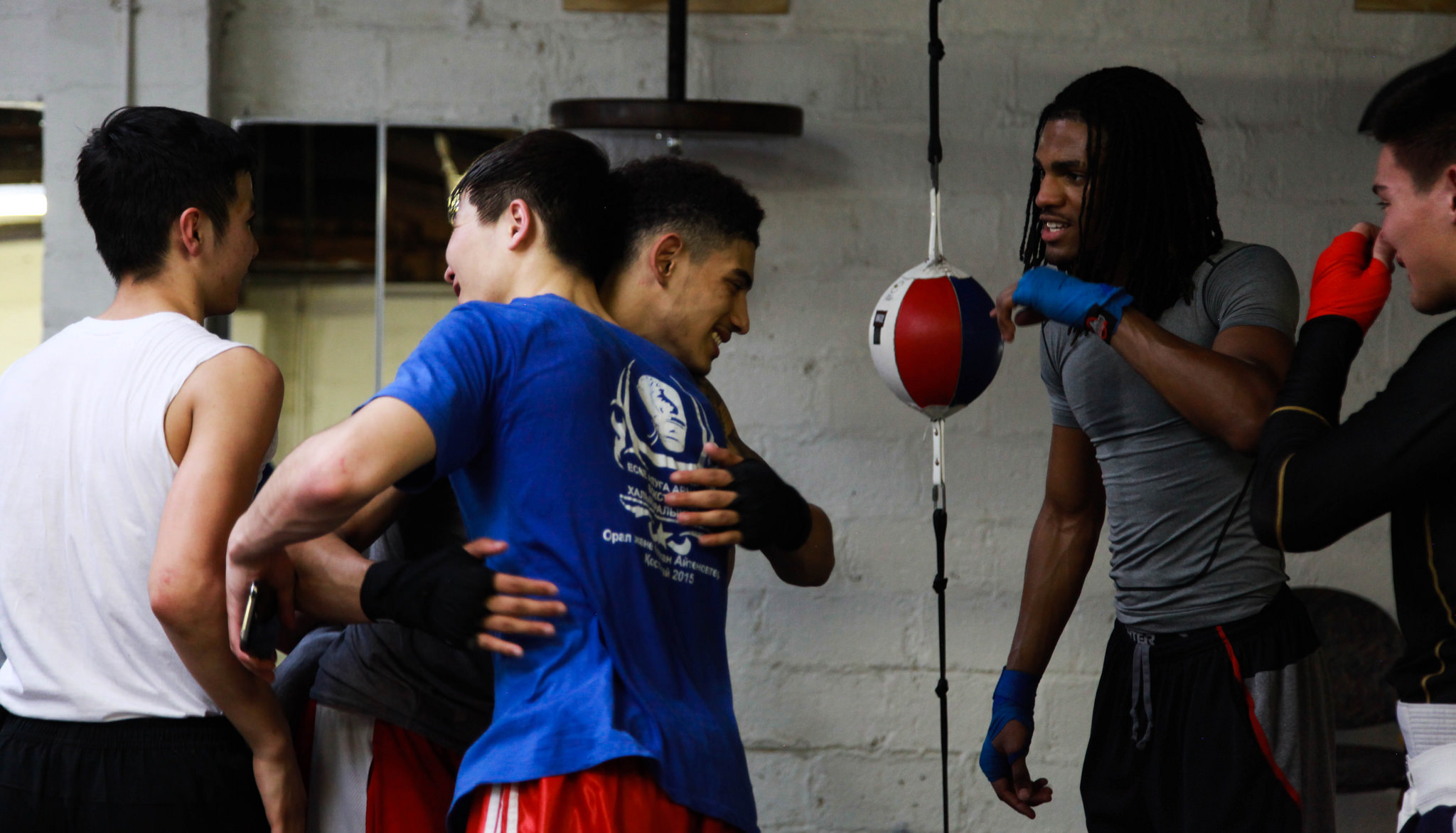
Boxers from Kazakstan visit TKO Boxing in Louisville, Kentucky, in 2016. USDoS/ECA photo
Sports diplomacy "has created hundreds of new friends for the United States in countries where we need friends," George Mason University professor Craig Esherick said in an email. He is also the associate director of the university's Center for Sports Management, which has developed programs with funds from the Sports Diplomacy Division. "Public diplomacy programs bring 'real people' together and help to create a new narrative about the United States. We have a great country that Americans are proud of and any interaction with sport diplomats enables our visitors to see the pride we have in the United States and also why we feel the way we do about our system of government."
Working as a mentor for the State Department's program, Stroman said, "helped me realize how our government is using … sport as a tool to help around the world, through cultural exchange and through conflict management.
"Right now, more than ever, I think the United States needs to wave a flag of peace, inclusion, and the empowerment of people, and I don't know if there's a better way to do it than sports diplomacy."
No comments:
Post a Comment